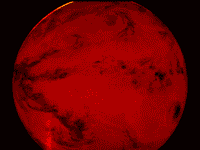 |
Paris, France (UPI) July 20, 2005 After wildfires and heat-induced health problems, Europe's blazing summer temperatures are sparking a new concern: Drought, and chances that sparse rainfall may severely shrink the region's agricultural output. And there is another concern for some: That the first signs of global warming are emerging in the extreme climatic conditions being witnessed across the continent this summer. From Plymouth to Porto, much of Europe has been basking in generally above-normal temperatures - and below-normal precipitation levels. While sunbathers pack Brittany and Cote d'Azur's beaches, French farmers are wringing their hands. According to a report published by the Brussels-based European Commission Friday, cereal production across the European Union is expected to drop 10 percent this year, compared to the previous year. Water rationing is in place across roughly half of France. And weather experts don't see the situation improving in the foreseeable future. "Even if the rest of the summer is rainy, we'll have a hard time building the water reserves back up," Nicole Bourdette, an analyst at Meteo France, the state weather station, told Liberation newspaper. "The drought is persisting and will likely get worse." France is hardly the worst-case scenario. Indeed, French grain forecasts for this year are better than the EU average - and agronomists estimate only a 4 percent drop in wheat production compared to last year. And experts say favorable weather in the coming weeks may yet save French corn harvests. And so far, the country has avoided the truly searing temperatures of 2003 that led to some 15,000 heat-related deaths. The picture is bleaker elsewhere in Europe. In Spain, 11 volunteer firefighters were killed last weekend as they tried to stop a blaze in the country's Guadalajara province. But quieter tragedies are unfolding as well. In the agricultural region of Murcia, Spain, some 70,000 families risk losing their livelihood because of lack of water, the local government says. Along with the regions of Alicante and Almeria, Murcia accounts for 72 percent of Spanish fruit exports and 90 percent of vegetable exports. Although the region uses water-saving drip irrigation, it risks losing half of its agricultural production, local officials say. Lack of rainfall is also creating storage water shortages. In some parts of Spain, dams are at their lowest levels in years. Swimming pools are dry and many villages are rationing water. In the case of Murcia, the drought has become politicized. The local head of Spain's opposition Popular Party has blamed the Socialist government of Prime Minister Jose Luis Rodriguez Zapatero for bad water management. Wildfires have ripped through neighboring Portugal. The country's forestry service says altogether 20 percent of Portuguese forests have been torched over the past five years. Experts estimate that 64 percent of Portugal is also touched by drought. "My animals usually eat straw during this season," Portuguese farmer Jose Antonio Palma complained, in published remarks. "But look there's nothing. There's no wheat because it hasn't rained. Everything is lost." Portugal's Agricultural Ministry says it has earmarked some $42 million in disaster funds to help with the drought's impact. In addition, Portugal reportedly will import 400,000 tons of wheat from Hungary for use as animal feed. If nothing else, some analysts say, the drought of 2005 is a warning call - possibly, one related to global warming. Overall, Europe's temperatures have inched up by nearly a degree Centigrade over the past century. Some forecasters predict they may continue rising from 2-6.3 centigrade by 2100. The fallout, experts say, may be continued droughts in southern parts of Europe, while an overabundance of rainfall elsewhere in the region. "It's an old idea in Europe that water is both abundant and free," wrote Liberation newspaper in an editorial Wednesday. "It's out of date. We need to consume less and pay more." Yet in Eastern Europe the problem this summer is too much rainfall, not too little. Romania and Bulgaria are battling a deluge of water - so much precipitation, in fact, that large swathes of land in both countries are submerged. "For years, the Cassandras of the environment have announced that water in the social and climatic conditions of the 21st century, will be the cause of serious conflicts," Liberation wrote, suggesting that these warning had not been heeded. "...Good weather seeds tempests." Community Email This Article Comment On This Article Related Links SpaceDaily Search SpaceDaily Subscribe To SpaceDaily Express Weather News at TerraDaily.com
 London UK (SPX) Dec 23, 2005
London UK (SPX) Dec 23, 2005This week's launch of MSG-2 will ensure that satellite images continue to be available to European weather forecasters well into the next decade. It also marks a new chapter in a long-term space experiment measuring the available energy that drives the weather as a whole, and helping to establish how much the Earth is heating up. |
|
| The content herein, unless otherwise known to be public domain, are Copyright 1995-2006 - SpaceDaily.AFP and UPI Wire Stories are copyright Agence France-Presse and United Press International. ESA PortalReports are copyright European Space Agency. All NASA sourced material is public domain. Additionalcopyrights may apply in whole or part to other bona fide parties. Advertising does not imply endorsement,agreement or approval of any opinions, statements or information provided by SpaceDaily on any Web page published or hosted by SpaceDaily. Privacy Statement |